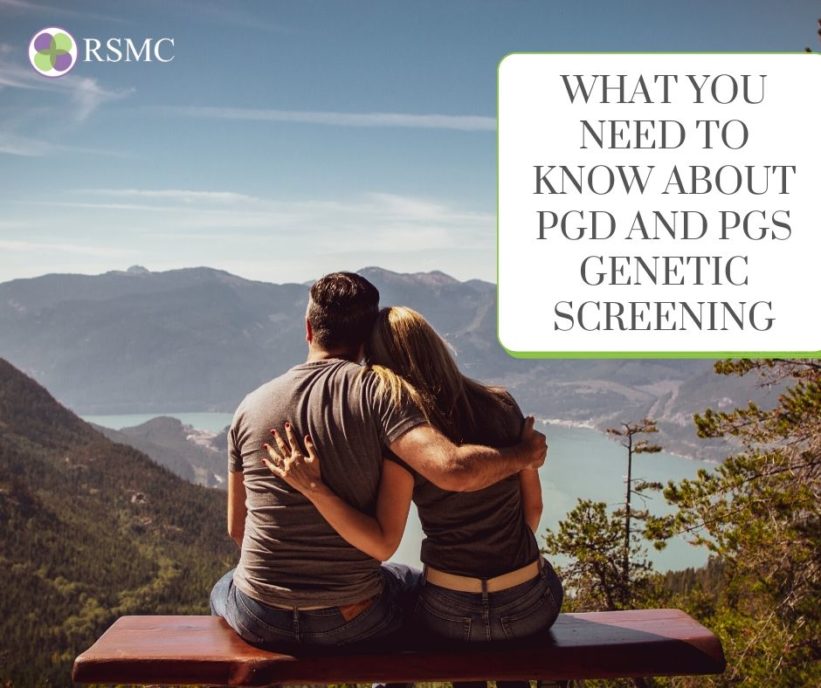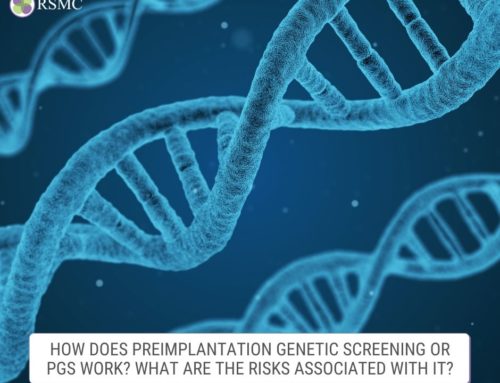Genetic screening technologies, like PGS (Preimplantation Genetic Screening) and PGD (Preimplantation Genetic Diagnostic) testing, enable doctors to detect genetic diseases in embryos before implanting them into the womb. When performed during IVF treatment, PGS and PGD testing can help minimize the risk of passing on undesirable genetic disorders.
Moreover, they can lower the risk of recurrent miscarriage and increases the chances of a healthy pregnancy.
The acronyms PGD and PGS are sometimes used interchangeably. However, they are carried out in a different way and for different purposes. In this post, we are going to look at the meaning of PGS and PGD, how they are different from a prenatal screening test, and the reasons why your fertility doctor may recommend any of these genetic screening.
There are a number of reasons to consider PGS or PGD testing, these include:
- Patients that are having IVF with advanced female age – 38 or older
- Patients of any age with repeated IVF failure – usually defined as 3 or more failed attempts
- Patients wishing to screen for inherited genetic diseases
- Patients wishing to screen for sex-linked diseases such as hemophilia
- Patients that are carriers of chromosomal translocations
- Patients that have had recurrent miscarriages
- Patients in need of human leukocyte antigen (HLA) testing
- Intended parents who wish to select their child’s gender
What does PGD mean?
PGD is an acronym for “preimplantation genetic diagnosis.”
Doctors perform it to check an IVF embryo for the presence of genetic diseases. This technique may be used to prevent the transfer of a hereditary genetic disorder or to choose a particular genetic tendency. In certain cases, one may need both.
For example, when a couple wants to create a baby who can be an HLA match for a family member pursuing a stem-cell transplant but also wants to forestall the transfer of the gene causing the disease that’s requiring the transplant.
Please note: PGD does check an IVF embryo for all possible genetic disorders. For example, if PGD testing shows that an embryo lacks the gene for cystic fibrosis, it does not tell you anything about other genetic diseases that might be present. It only tells you there is little to no chance of cystic fibrosis.
What does PGS Test mean?
PGS is short for “preimplantation genetic screening”. It is different from PGD as it does not screen for specific genes but the embryo’s total genetic makeup.
Embryos can be classified either as being euploidy or aneuploidy. Under normal conditions, both the female egg and the sperm contribute 23 chromosomes each at conception. So, the embryo formed has a total of 46 chromosomes. We refer to such embryos as euploid embryos.
However, if the resulting embryo has an additional chromosome or is missing one – we call it aneuploidy. Such embryos are more likely to fail to implant or result in a miscarriage. Even if implantation, pregnancy, and successful birth take place, aneuploidy embryos can result in a child with severe physical or mental disabilities.
Comprehensive Chromosome Screening is also a PGS procedure. This form of PGS testing is useful in determining if an IVF embryo is XX (female) or XY (male). Doctors may also carry out this test to avoid a genetic disorder that affects a particular gender or to help “balance” a family.
How Prenatal Testing and PGD/PGS Are Different?
PGS and PGD testing are both performed before implantation. Whereas, prenatal testing takes place after the embryo has been implanted in the womb.
After prenatal testing, people who choose not to abort the pregnancy live with the fear of what is to come. Other than worrying about begetting a child with life-long disabilities, they are also at more risk of having a stillbirth. On the other hand, those who decide to terminate the pregnancy experience sadness, guilt, and the pain and recovery of abortion.
Moreover, many people don’t support abortion due to religious or moral reasons. However, they see nothing wrong in preimplantation genetic screening before transferring the embryo. However, PGS and PGD do not come with any guarantee. For this reason, a lot of doctors recommend going for prenatal testing as well as PGD or PGS, in case a genetic diagnosis was wrong or missed.
Reasons for a Certain Genetic Diagnosis With IVF
Here some reasons why your doctor may recommend that you undergo PGD (or reasons you may request for it).
To avoid the transfer of a hereditary disease common within a family
This is the main reason for PGD testing. The risk of passing on a genetic disorder to an offspring is somewhere between 25-50%. Although, it depends on whether the disease is carried by a dominant or recessive gene.
In some cases, a couple may be pursuing IVF, not because they are struggling with fertility, or need help to conceive. PGD testing may be their only reason for undergoing IVF.
As said earlier, prenatal testing may also help check for genetic diseases without the added risks and expenses of IVF treatment. However, because abortion (or continuing the pregnancy) is the only option after prenatal testing, some people don’t approve of this.
To screen for chromosomal rearrangement or translocation
Some people have all the 46 chromosomes when they are born, but one or more is not in the correct position. While these people may not have any defects, they are more likely to struggle with infertility. They may even have a pregnancy that ends in miscarriage/stillbirth or have a child with a chromosomal abnormality.
For individuals whose spouse has a chromosomal translocation, PGD can help figure out embryos that may be healthy.
For human leukocyte antigen (HLA) matching for stem-cell transplant
The only known way to cure certain blood diseases is to do a bone marrow transplant. For patients pursuing such a transplant, it’s not always easy to find a stem-cell match within the family. Fortunately, the Preimplantation Genetic Diagnosis test can be done to choose an embryo that is a stem-cell match and to prevent passing on that disease that is requiring the transplant.
Once an embryo that is a stem-cell match has been identified and healthy birth takes place, the stem cells needed to cure the relative can be gotten from the cord blood when the baby is born.
To avoid the transfer of a genetic tendency of an adult-onset disease
Preimplantation genetic diagnosis (PGD test) is also useful to prevent the transfer of genetic predisposition that can result in a disease in the future. For instance, PGD may take place to screen for the breast cancer gene (BRCA-1 variant) in embryos. It can also be helpful to identify early-stage Alzheimer’s disease and Huntington disease.
Reasons for General Genetic Screening (PGS) With IVF Treatment
Here are some of the reasons why your fertility specialist may recommend PGS testing combined with IVF Treatment:
To increase the chances of success with elective single embryo transfer
Studies have shown that PGS can raise the odds of pregnancy and reduce the miscarriage risk in patients pursuing elective single embryo transfer.
In elective single embryo transfer, a single healthy embryo is transferred into the womb of the female patient. An alternative to this is double embryo transfer, in which the doctor transfers two embryos at once. While the latter technique improves the chances of conception, it is more likely to result in multiple pregnancies. This can affect the overall health of the mother and the babies.
To identify genetic gender
PGD can help figure out whether an embryo is male or female. This usually takes place to check for a gender-specific disorder and maybe a less expensive way to prevent a genetic disease than PGD.
PGS may also help a couple have a child of a particular gender when they are looking to “balance” their family. For instance, if they already have a boy in the family and now desire a baby girl or vice versa.
To minimize the risk of miscarriage in women with a history of recurrent pregnancy loss
It is not uncommon for pregnant women to have a miscarriage. In fact, 1 out of 4 pregnancies results in miscarriage. However, what is not common is recurrent pregnancy losses. In this case, the woman loses two or more pregnancies one after the other. PGS can help reduce the likelihood of another miscarriage.
But for patients whose miscarriages are not due to a genetic tendency for pregnancy loss, it’s unclear whether IVF with PGS can increase the chances of having a live birth more than natural conception would. Although it may reduce the risk of miscarriage, a healthy pregnancy might not occur sooner.
To improve the chances of pregnancy success for patients pursuing IVF treatment
Some physicians may suggest IVF along with PGS to increase the odds of conceiving for couples who have had repeated implantation failure, women of late reproductive age, or in case of male factor infertility.
Final words
Note that only you and your fertility doctor can choose whether IVF treatment with PGD or PGS is good for you. Before reaching a decision, you need to know the potential risks, the costs, and the reasons why any of these reproductive technologies may be recommended.
If you would like to know more about how PGS/PGD can help you in your family building journey, please schedule a consultation at RSMC here. You can also visit us at https://www.fertile.com to learn more about who we recommend should take advantage of genetic screening.























